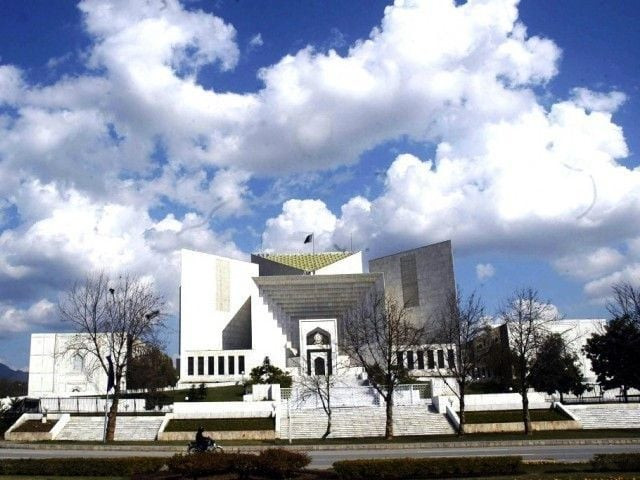SC offers relief to mentally ill convicts
Commutes death sentence of two prisoners to life imprisonment

In a landmark verdict, the top court has commuted the death sentence of two mentally challenged patients – who have been behind bars for decades – to life imprisonment while also asking the authorities to avoid a limited definition of mental disorders.
A five-judge larger bench presided over by Justice Manzoor Ahmad Malik issued a 51-page judgment on petitions filed by the families of convicts after hearing the case at the Supreme Court Lahore Registry.
"Without touching on the mental health condition of the convict Imdad Ali, we have observed that there are sufficient reasons and circumstances available on record that warrant the conversion of the prisoner's death sentence to imprisonment for life," stated the verdict released on Wednesday.
"Firstly, the motive set up by the prosecution was disbelieved by the trial court [as detailed] in [the] para 25 of its judgment after assigning valid and convincing reasons. This fact was not considered by this court while dismissing the appeal of the prisoner, perhaps due to lack of proper assistance."
This oversight, the judges maintained, qualifies as a ground for review and consequently converting the sentence of death to imprisonment for life.
"Secondly, as earlier pointed out, the convict has already served about 20 years of his substantive sentence. Therefore, on the principle of legitimate expectancy of life recently considered by this court in the case of Sikandar Hayat and another versus the state and others, he is entitled to the conversion to life imprisonment."
"The conviction of the appellant under section 302(b) PPC [Pakistan Penal Code] is maintained. However, his death sentence is converted into imprisonment for life, with the benefit of section 382-B, CrPC [Code of Criminal Procedure].”
The apex court, however, added that the amount of compensation and sentence in its default in the case shall remain intact.
Regarding the death sentence of the second prisoner, Kaneezan Bibi, the court observed that the convict is behind bars for about 32 years, meaning she has served more than the alternate sentence provided under section 302(b) PPC, ie, imprisonment for life.
"On this score, it is a fit case where the principle of legitimate expectancy of life can be invoked," the court said, observing that the prisoner did not file any review petition after the dismissal of her criminal appeal by the court on March 2, 1999.
"In the circumstances of the case, since no review petition has been filed by Kaneezan Bibi, we while exercising our suo motu jurisdiction to review coupled with the power available to this court under Article 187 of the Constitution to do complete justice, review the judgment dated March 2, 1999 only to the extent of Criminal Appeal No. 415 of 1994 filed by Kaneezan Bibi."
Consequently, the top court added, Criminal Appeal No 415 of 1994 is partly allowed. "The conviction under section 302(b)/34 of the PPC on six counts is maintained, however, her sentence of death on six counts is converted into imprisonment for life on six counts."
Maintaining the earlier verdict of the trial court, the court directed the convict to pay a compensation of Rs20,000 under section 544-A CrPC to the legal heirs of each deceased, in default whereof she will have to undergo imprisonment for six months on each count.
It further said that the "benefit of section 382-B, CrPC is extended to the prisoner," adding, "all the sentences of imprisonment shall run concurrently".
Discussing the case of another mentally challenged inmate Ghulam Abbas, who was awarded life imprisonment, the top court noted that the convict has exhausted all the remedies available to him under the law.
However, the plea filed by the prisoner that he is suffering from a mental illness is endorsed by the report of the medical board constituted by the court.
"Though a mercy petition filed by condemned prisoner Ghulam Abbas was rejected by the President, yet there is nothing on record to show whether the ground of mental illness was taken into consideration."
"Keeping in view the judgment of this court and on consideration of the peculiar circumstances of the instant case, we direct the concerned jail superintendent to ensure that a fresh mercy petition is filed on behalf of the condemned prisoner," it said.
The apex court maintained that the mercy petition is to be prepared in accordance with relevant prison rules and submitted to the president, mentioning the plea of mental illness along with the copies of his medical history and copies of the report of the medical board and this judgment."
"We expect that the mercy petition filed on behalf of the prisoner shall be disposed of after taking into consideration all the circumstances including the observations made by this court in the judgment."
The court also ordered authorities to immediately shift the two prisoners to the Punjab Institute of Mental Health in Lahore in accordance with provisions of the prison rules for their treatment and rehabilitation, till the disposal of mercy petition.
"On the completion of their sentence, they shall be examined afresh by a medical board and shall be released from the hospital as and when the said board opines that they are fit for themselves and for the society," it added.
It directed the federal and all the provincial governments to immediately make necessary amendments in the relevant laws and rules in light of the observations given in the judgment. "The prison rules shall be appropriately amended so as to bring the jail manuals of all the provinces in harmony"
Constitution of medical boards
The court also directed the federal government and all provincial governments to immediately establish high security forensic mental health facilities in the teaching and training institutions for mental health for the assessment, treatment, and rehabilitation of under trial prisoners and convicts who have developed mental ailments during their incarceration.
"The governments shall immediately constitute and notify a board comprising three qualified and experienced psychiatrists and two psychologists from the public sector hospitals for the examination and evaluation of the prisoners who are on death row and are suffering from the illness…
“[The board shall also] ensure that those who no longer have the higher mental functions to appreciate the rationale and reasons behind the awarded death sentence are not executed.
The authorities shall immediately constitute and notify a board comprising 2 qualified and experienced psychiatrists and 1 psychologist from the public sector hospitals in Islamabad and at each divisional headquarters of the provinces for the examination, assessment and rehabilitation of the prisoners.
The said medical board shall also be authorized to examine the accused persons referred by the trial courts for examination under the provisions of sections 464 and 465 CrPC, the order added.
"The federal and provincial governments shall immediately launch training programmes and short certificate courses on forensic mental health assessment for psychiatrists, clinical psychologists, social workers, police and prison personnel," it added.
The top court further directed the Federal Judicial Academy in Islamabad and all provincial judicial academies to arrange courses for trial court judges, prosecutors, lawyers, and court staff on mental illness, including the forensic mental health assessment.
Mental health legislation
The bench, in its judgment, observed that “an examination of the definitions for mental illness provided for in the domestic and foreign laws establishes the fact that the terms “mental illness” or “mental disorder” are both used to refer to mental ailments and are defined by medical science.
It is with the developing nature of medical science that the scope of the terms may also evolve.
"Therefore, we are of the view that a limited definition of the terms “mental disorder” or “mental illness” should be avoided, and the provincial legislatures may, in order to better appreciate the evolving nature of medical science, consider to appropriately amend the relevant provisions of mental health laws to cater for medically recognized mental and behavioral disorders as notified by the World Health Organization (WHO) through its latest edition of the International Classification of Diseases (ICD)."
It has been noted, the court observed, that the evolution of medical science and human rights has sensitized the society to stigmatic labels such as “unsound mind”, “lunatic” and “insane”.
“Latest legislations all over the world do not use such terms. Therefore, we consider it appropriate to direct that the terms ‘unsoundness of mind’ and ‘unsound mind’ occurring in the PPC, the CrPC and the prison rules be substituted with term ‘mental disorder’ or ‘mental illness’.
"The term 'lunatic', wherever it occurs, shall also be substituted appropriately,” the verdict said.
Convictions
Imdad Ali, aged 42 years when arrested, was sentenced to death on July 29, 2002 for murdering Hafiz Muhammad Abdullah at Burewala in district Vehari.
Kaneezan Bibi, aged 24 years when arrested, was sentenced to death for killing Maryam Bibi, Aslam, Shaukat, Liaqat, Razia and Safia on the night between July 27 and 28, 1989 in tehsil Kamalia.
Ghulam Abbas, 23-year-old at the time of committing the offence, was sentenced to death for murdering Wajid Ali and assaulting Wajid’s wife Saima Bibi on September 2, 2004 in Rawalpindi.



















COMMENTS
Comments are moderated and generally will be posted if they are on-topic and not abusive.
For more information, please see our Comments FAQ